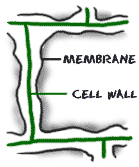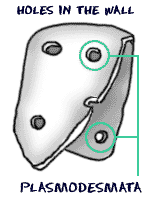
Cell Wall - What's it for?
 Cell membranes surround every cell you will study. Cell walls made of cellulose are only found around plant cells and a few other organisms. Cellulose is a specialized sugar that is classified as a structural carbohydrate and not used for energy. If a plant cell is like a water balloon, the cell wall is like a cardboard box that protects the balloon. The balloon is protected from the outside world by a structure that provides protection and support.
Cell membranes surround every cell you will study. Cell walls made of cellulose are only found around plant cells and a few other organisms. Cellulose is a specialized sugar that is classified as a structural carbohydrate and not used for energy. If a plant cell is like a water balloon, the cell wall is like a cardboard box that protects the balloon. The balloon is protected from the outside world by a structure that provides protection and support.
While many sugars, such as glucose, can dissolve in water (H20), cellulose will not dissolve in water and can form long chains to support plants. When you eat plant material, you can’t even digest and break down cellulose for energy. Cows and other herbivores have special bacteria in their stomachs to digest the cellulose polymers.
While cell walls protect the cells, they also allow plants to grow to great heights. You have a skeleton to hold you up. A 100-foot tall redwood tree does not. It uses the strong cell walls to maintain its shape. For overall support, dense cells in the core of the trunk can let a tree grow very high. Cell walls are slightly elastic for smaller plants, leaves, and thin branches. Winds can push them from side to side and they bounce back. Big redwoods need strength in high winds and sway very little (except at the top).
Another Hole in the Wall
 A cell wall is not an impenetrable fortress around the delicate plant cell. There are small holes, called plasmodesmata, in the cell walls between plant cells. The cell membranes of neighboring cells are able to connect through these holes. The connections allow the transfer of nutrients, waste, and ions (symplastic pathways). Molecules can also pass through the spaces within the cell walls, avoiding the cells completely (apoplastic pathways).
A cell wall is not an impenetrable fortress around the delicate plant cell. There are small holes, called plasmodesmata, in the cell walls between plant cells. The cell membranes of neighboring cells are able to connect through these holes. The connections allow the transfer of nutrients, waste, and ions (symplastic pathways). Molecules can also pass through the spaces within the cell walls, avoiding the cells completely (apoplastic pathways).
It is great that nutrients can move from cell to cell, but there is also a problem with all the holes. Cells can lose water. Plants lose large amounts of water in the middle of the day or on very hot days. When the air heats up and the water vapor pressure decreases, plants lose water through the process of transpiration. The water escapes through pores on the surface of the plant called stomata. Even when the plant cells lose water, the basic shape is maintained by the cell walls. The plant may droop or wilt, but it can recover when water returns to the system. It will look just the same as when it started.
Cell Walls in Other Species
You may hear about cell walls in other species. Bacteria have a structure called a cell wall. Fungi and some ptotozoa also have cell walls. They are not the same as the plant cell walls made of cellulose. The other walls might be made from proteins or a substance called chitin. Chitin is another structural carbohydrate. They all serve the same purpose of protecting and maintaining structure, but they are very different molecules.Related Video...
Cell Walls (Max Planck Society Video)
Encyclopedia.com:
http://www.encyclopedia.com/topic/Cell_Wall.aspx
Wikipedia:
http://en.wikipedia.org/wiki/Cell_wall
Encyclopædia Britannica:
http://www.britannica.com/EBchecked/topic/101396/cell/37446/The-plant-cell-wall?anchor=ref313833



